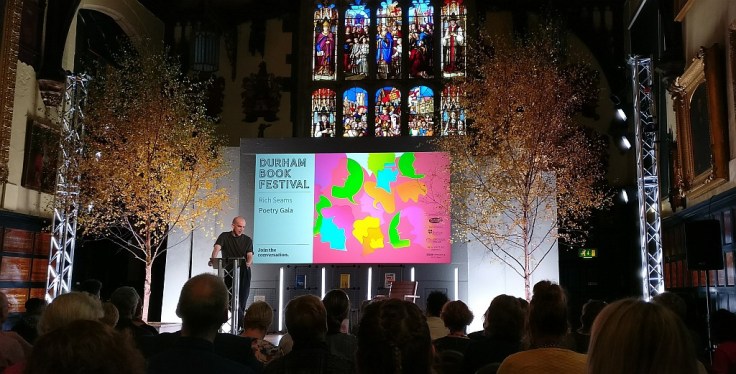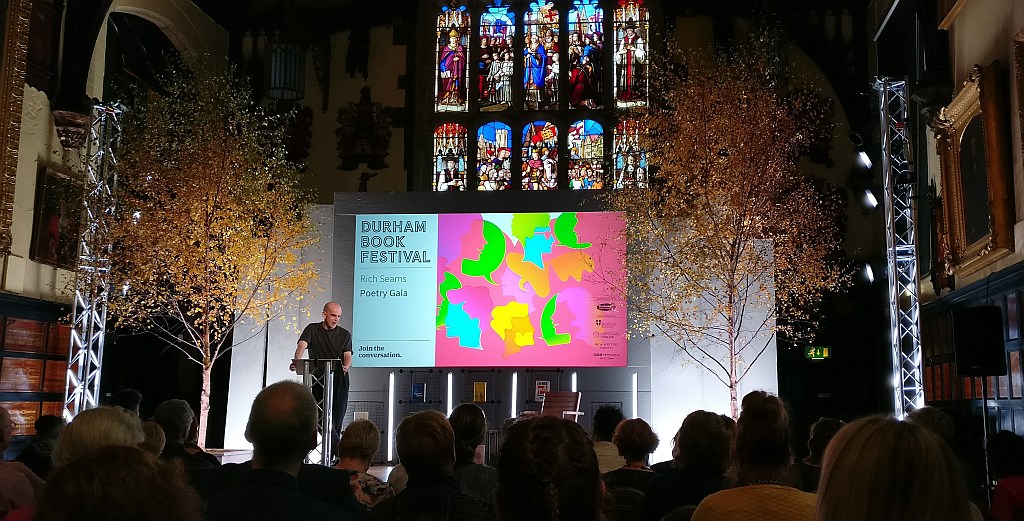Defining the North is an always-provocative challenge, but poetry – with its attention to language and voice – provides a fine form through which to explore and celebrate the region’s identity. This was one idea behind the Northern Poetry Gala at Durham Book Festival, which brought together several of the North’s newest and exciting writers. Suzannah V. Evans listened in.
We were gathered in the beautiful interior of Durham Town Hall, surrounded by stained glass windows and oil paintings, to hear some of the most exceptional poets currently writing in and around the North of England. The event was curated and presented by Andrew McMillan, this year’s Festival Laureate, who noted that the poetry gala provided him with an opportunity ‘quite selfishly, to put myself in a room with poets whose work I admire’. Andrew was introduced by Professor Stephen Regan, who commented that Andrew had been a ‘brilliant’ Festival Laureate, visiting schools in the region, as well as interviewing Alan Hollinghurst and hosting a poetry breakfast. A Festival Laureate, Stephen asserted, should be someone who ‘can take on subjects that are topical and provocative. Andrew McMillan is definitely that kind of writer’.
Andrew himself praised the ‘multitude of voices that we have in the North of England’, and was excited to introduce the afternoon’s line-up of readers.
 After reading a poem of his own, entitled ‘Jacob with the angel’, he introduced Kim Moore. Her poetry, he noted, is ‘rooted in her family identity, in her working class identity, and also, importantly, in the female experience’. Kim opened her reading with ‘My People’:
After reading a poem of his own, entitled ‘Jacob with the angel’, he introduced Kim Moore. Her poetry, he noted, is ‘rooted in her family identity, in her working class identity, and also, importantly, in the female experience’. Kim opened her reading with ‘My People’:
I come from people who swear without realising they’re swearing.
I come from scaffolders and plasterers and shoemakers and carers,
the type of carers paid pence per minute to visit an old lady’s house.
The poem’s repetitions carry it forwards, and it ends with a lovely image of Kim’s ‘people’ as wolves, talking to the moon in their sleep. ‘I never read that poem any further south than Manchester’, Kim joked.
Zaffar Kunial was the next poet to read. A Faber New Poet, Zaffar writes ‘intelligent and considered poetry’, Andrew proclaimed, and he started by reading a poem centred on a childhood fight. ‘Spark Hill’ opens with the repeated word ‘fight’, acoustically unsettling the audience, and is set in Birmingham. Zaffar’s second poem, ‘Prayer’, begins and ends in a hospital, where the speaker ‘hurled language’s hurt’ with grief at his mother’s illness. The poem is moving, ending with the speaker’s troubling thought that his mother may not have heard his whispered words of thanks.
Andrew then introduced Degna Stone, who enthused that it was ‘fantastic hearing everyone read’. Her first poem was written in response to the fifty year anniversary of Martin Luther King receiving an honorary doctorate from Newcastle University. ‘I’ve always shied away from writing about race, but I feel the moment for shying away has passed’, she said. A second poem addressed the personal happiness she had found in the North of England – a joy that was interrupted when her husband fell ill. ‘Weighing of the Heart’, then, was written in tribute to the surgeons in Newcastle who were able to return her husband to health.
Polly Atkin also turned her focus to the idea of home, noting that she has a ‘slightly troubled’ relationship with the concept. Though from the Midlands, she now lives in Cumbria; ‘In the city I was born in’ was written when she was yearning to be back there, but living in Nottingham:
Can I honestly say I belong to you, city
that refuses to comply with the national weather,
sole grey smear on a whited-out map?
Her voice as she read was silky and low, curling itself into the ears of those present.
Mark Pajak is from Merseyside, although he began with a poem set in Scotland. ‘Camping on Arran, 1992’ recounts a trip with his father, recalling the moment when the pair ‘lay like hands held in one pocket’. He was pleased with the audience’s applause, noting that his father’s response to the poem had been more ambivalent, and his second poem also investigates masculinity. ‘Trick’ turns on the ‘challenges of masculinity’, addressing a stunt that doesn’t quite go to plan. Mark’s performance was measured, and he looked up and made generous eye contact with the audience as he read.
Andrew called attention to the various ‘geographical spaces’ the poems were inhabiting, before introducing Pippa Little, whose recent collection Twist, he noted, had received very positive reviews [paywall]. Pippa acknowledged the complexities inherent in northern identity – ‘There are a lot of complications about being northern’ – before reading ‘Coalend Hill Farm 1962’ and then ‘Against Hate’, a poem which prizes quotidian moments of joy:
These are small things, but I pass them on
because today is bloody, inexplicable
and this is my act, to write,
to feel the light against my back.
Vidyan Ravinthiran read next, choosing four sonnets from his second book of verse, The Million-Petalled Flower of Being Here. Addressed to his wife, Jenny Holden, the sonnets were written when he was living in Durham, and address the ‘concerns and experiences of a mixed race couple living in the North of England’, as Andrew noted. The opening sonnet, ‘Brexit’, sees the speaker at Durham train station, imagining how his fellow travellers might have voted in the referendum. Other sonnets contain flashes of beauty, so that ‘Today’ is lit with ‘the glow of radiant petals’, and Vidyan’s reading is even-toned and clear.
Ruby Robinson’s Every Little Sound was published in 2016 by Pavilion Poetry, the ‘new northern powerhouse of publishing’, in Andrew’s words. Her poetry is able to ‘transcend the everyday and say something universal’, and Andrew praised its ‘honesty, its directness’. Ruby lived briefly in Sheffield as a child, and has now returned to the area to be closer to her mother. ‘My Mother’, a poem I first heard at the 2016 T. S. Eliot prize readings, juxtaposes sights seen on a trip with her mother with the various topics the pair discuss:
She said the cornflake cake made her day,
she said a man cannot be blamed for being
unfaithful: his heart is not in tune with his
extremities and it’s just the way his body
chemistry is. She said all sorts of things.
As Ruby read, she gestured slightly, each gesture like half a thought.
Seán Hewitt, a poet ‘attuned acutely to the natural world, but also aware of the divinity of the body’, as Andrew noted, read next. He leaned into the podium to speak, and as he read, certain lines jumped out for their acoustic attention to the environment, as in ‘In Princes Park’:
a woodpecker in repeated short bursts
shakes hold of the quiet, sending its echo
ricocheting through the wood, knocking
at each tree for the unsuspecting
bright splint of life
I was equally struck by ‘the clatter-iron blackbird’ in ‘Evening’, and the same poem’s image of ‘dusk; and the garden is re-assembling’.
Malika Booker infused her reading with energy and charm, and was described by Andrew as one of our most ‘engaging’ performers. She pointed with her finger to emphasise lines as she read, explaining ‘if I could sing, I would do R&B, and not poems’. This interest in music translated to her body as she read, and she moved to the rhythms of her speech, her voice growing louder as each poem reached its conclusion. ‘Warning’ was given a particularly dynamic performance:
My pores swelled, I went to the kitchen,
took down that knife, marched upstairs,
told him, I cutting it off if you lose your mind.
Don’t think it and if you do, don’t sleep.
Andrew finished the afternoon by reading his own poem, commissioned specially for Durham Book Festival. ‘I was trying to think about my connection to this region’, he said, and as he read, he slowed his speaking voice down as if savouring the poem. Stephen then thanked the audience for their support, rejoicing in an afternoon of readings that were ‘captivating, moving, stirring’.
The Rich Seams Poetry Gala may be over, but there are still many opportunities to enjoy new poetry in the North East, which is a hotbed of new writing and lively readings. Among others, follow New Writing North and our own Centre for Poetry and Poetics for events throughout the year.














